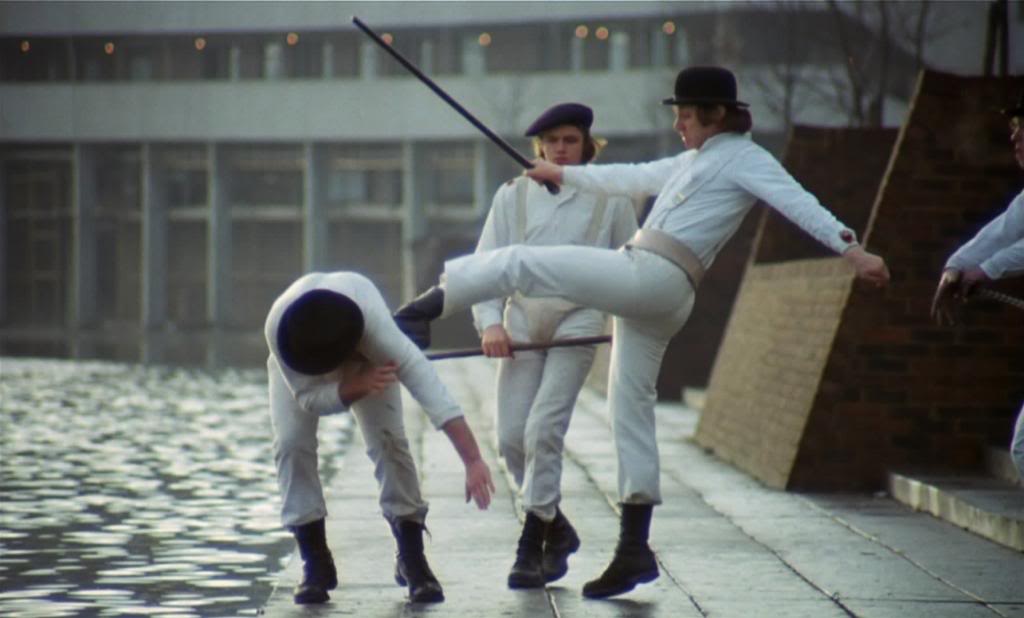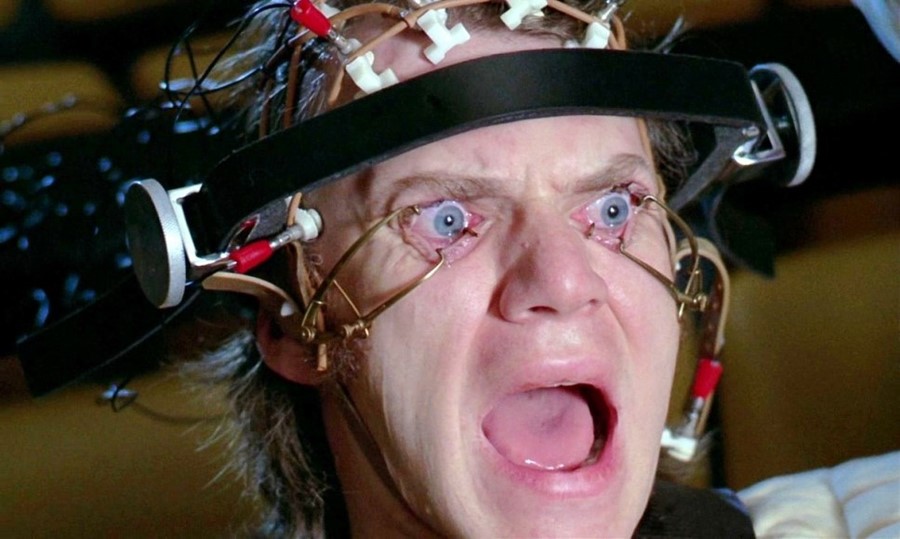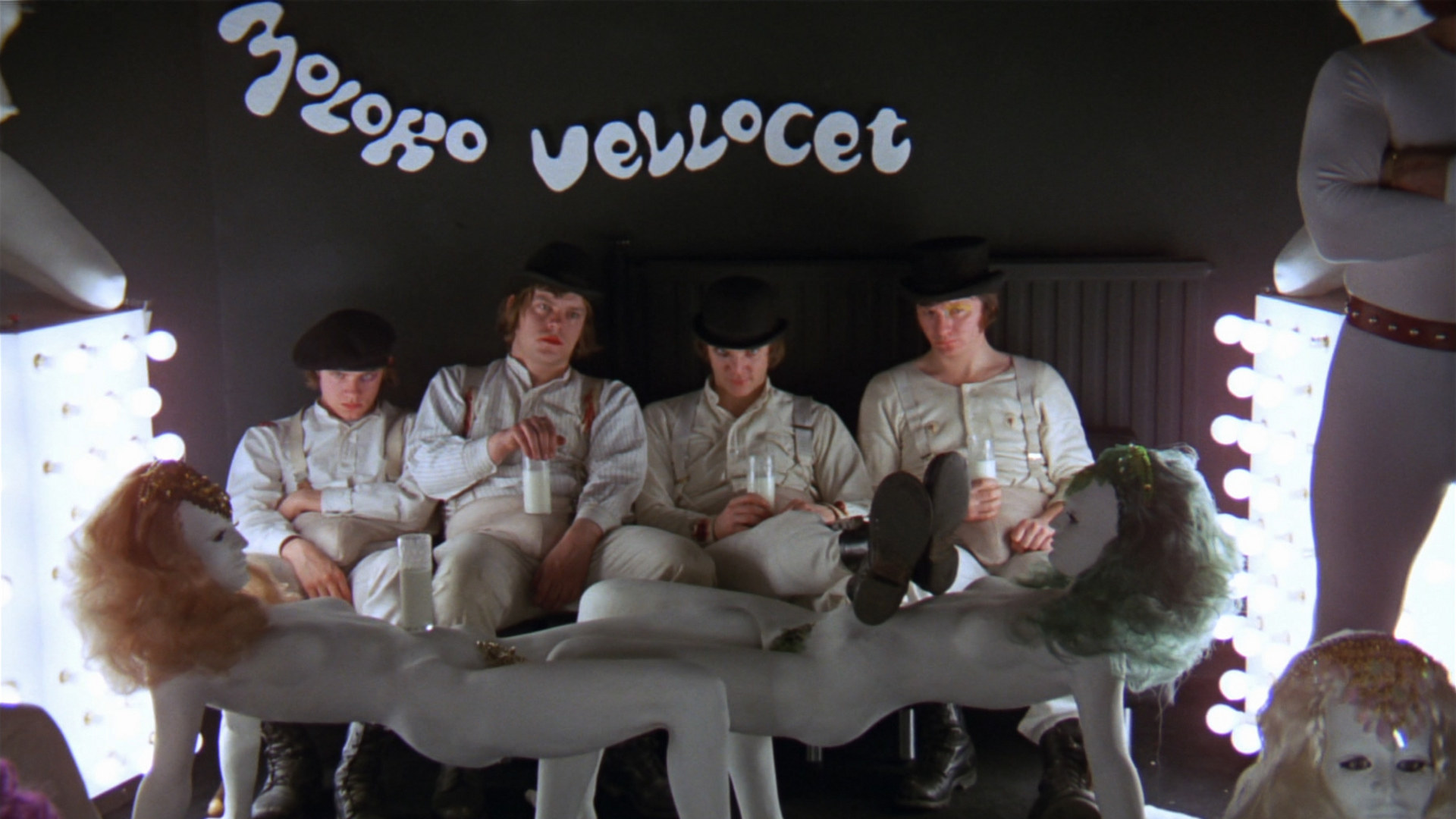“Advice: don’t read/ A Clockwork Orange – it’s a foul farrago/ Of made-up words that bite and bash and bleed./ I’ve written better books… So have other men, indeed./ Read Hamlet, Shelley, Keats, Doctor Zhivago.” – Anthony Burgess
Regardless of Burgess’ attitude towards his most controversial book, A Clockwork Orange (1961), he inadvertently forced people to change the way they view society or at least question it. This near-future, fictional dystopia follows a teenage boy (Alex DeLarge) and his barbaric way of escaping a world ruled by mindless totalitarianism. For Alex, living violently is the only way to live authentically under this repressive regime. Behaving in accordance with the law is submitting to the government’s contrived notion of social order.
Through Alex DeLarge’s narrative, we see the prevalence of morality and mediocrity, and the cruel approach to the treatment of the mentally ill, in what Burgess depicted as the early 21st century. A Clockwork Orange seemingly portrayed the societal issues in the sixties, however, it could be called a modern-day parable. It urges the question of how much society has changed in the past sixty years: is A Clockwork Orange still a good representation of modern day civilization? Have we really evolved into a more progressive society, or did we plaster civilization’s wounds instead of healing them?
Morality
The theme of religion, initially introduced with a decorative statue of Jesus Crucified, adds to the increasing objectivity of what is right and wrong.
People used to treat the Bible as the rubrics to survival, the map to Eden. If you follow the Ten Commandments, (for example, “thou shalt not steal”), you will go to Heaven, if not, you will go to hell. With Atheism on the rise, the most prominent, present-day administration replaced hell with jail, “thou shalt not steal or you will spend a year in a cell”. Pastors are replaced with teachers, the Ten Commandments are replaced with the law.
Masses of people used to follow the Church as it gave them purpose and faith – religion acted as a shepherd for the sheep. It forced people to follow a moral codex as there was the fear of punishment on Judgement Day (“God is always watching”). As society’s religiousness faded, the need to regulate behavior remained, to which the government stepped into the Church’s role, replacing internal damnation with mundane punishment. This, however, is limited by human fallacy, the government is not a supernatural force that can monitor everything, therefore people think they can get away with committing immoral acts. In the same way, Alex DeLarge never thought he would get caught for raping and assaulting people, he never thought he would actually go to jail and suffer the repercussions for his violence, that is, until one of his victims died.

Mediocrity
Burgess undermines youth culture’s complacency and alleged defiance throughout the book by demonstrating the protagonist’s need to live authentically under a repressive regime, juxtaposing his passive appearance. When with his “droogs” (Alex’s slang for ‘friends’, derived from the Russian word друг), Alex listens to conventional pop music, he dresses the same as every other teenager (as if in uniform). Alex conforms to youth culture whilst preaching anarchy. This hypocrisy typifies that people yearn to fit in, because as much as we crave individuality, not relating to others or having a sense of community is a lonely existence.
Nowadays, everyone strives to be eccentric, to be different. However, by following the trend of individuality one remains a sheep; you are still controlled by your environment, and you are still the same as everyone else.
The issue of conformity goes deeper than appearances. Burgess views society (specifically young people) as mediocre and morally neutral, making them easily influenced by their environment. We look for other ways of direction, whether it is social media, teachers, parents, friends, movies, the law, etc. For instance, the glamorization of drug use in Hollywood films and the normalization of sexism in primary school material “women are nurses”, “men are doctors”.
Treatment of the Mentally Ill
Ludovico’s Technique is a prime example of how institutions solve the issue of mental illness. In A Clockwork Orange, Ludovico’s technique is a drastic form of aversion therapy that causes the patient to vomit at the sight or even thought of violence. It does not “cure” the individual, instead, it makes them suffer more for the sake of the rest of society. This reveals the government’s philosophy: as long as the problem is not visible to the naked eye, it is not there.

In the book, Alex DeLarge’s morality is not altered by the Ludovico technique, he does not understand why raping and assaulting people is wrong, he knows it will make him belch. This so-called treatment does not treat Alex, it treats society as a whole whilst snubbing the patient’s happiness. Alex is still human, and all humans should be given the chance of rehabilitation.
An MIA survey stated that 37% of psychiatric patients in America were physically abused in asylums and only 17% were satisfied with their treatment. This goes back to the government: more regulation and subsidization of psychiatric wards could improve the treatment of the mentally ill, but politicians would rather fund e.g. the military. As long as the country’s HDI and GDP remain untainted, the solution is considered adequate since the rest of society is functioning.
Conclusion
Through A Clockwork Orange, Burgess points out the shortcomings of society in his day and age (immorality, mediocrity, and ignorance being just some of them). Alex DeLarge is the exaggerated epitome of an ordinary person wanting to live freely, though he chooses to do so by hurting the people that supposedly do the exact opposite; he cuts and stabs the conformists because it is the closest he can get to undermining conformity. Are the nuances of modern day society really that different from what they were 60 years ago? Have we really evolved, or improved in regards to our approach to people? Similarly to Alex DeLarge, the reason for people’s halt in behaviors that may harm others is, instead, fear of harm to oneself.
Image Sources: https://www.dazeddigital.com/life-culture/article/51104/1/anthony-burgess-didn-t-actually-want-people-to-read-a-clockwork-orange
